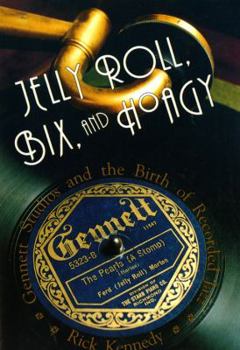Jelly Roll, Bix, and Hoagy: Gennett Studios and the Birth of Recorded Jazz
Select Format
Select Condition 
Book Overview
Some of the earliest performances by the likes of Jelly Roll Morton, the New Orleans Rhythm Kings, King Oliver, Louis Armstrong, and Bix Beiderbecke were preserved on recordings produced at Gennett Studios, an independent company in Richmond, Indiana, from 1917 to 1932. This book presents an account of the people and events behind the company.
Format:Paperback
Language:English
ISBN:0253213150
ISBN13:9780253213150
Release Date:March 1999
Publisher:Indiana University Press
Length:272 Pages
Weight:0.95 lbs.
Dimensions:0.8" x 6.0" x 9.0"
Customer Reviews
3 ratings
Fascinating account of an obscure topic!
Published by Thriftbooks.com User , 18 years ago
I LOVED this book! I would not have expected that enough people would be interested in Gennett Records to warrant such a publication, but obviously (and delightfully) I'm wrong! Recommended reading for any record collector, but especially those of early jazz.
Fascinating!
Published by Thriftbooks.com User , 19 years ago
Any collector of old 78s knows about the Gennett label. Gennett was the first independent label to have a serious impact on the recording industry, and in part helped to launch the careers of many early jazz legends. King Oliver, Louis Armstrong, Jelly Roll Morton, Bix Beiderbecke, Hoagy Carmichael, Earl Hines, and others made their first records in Gennett's hot, cramped studio by the side of railroad tracks in Richmond, Indiana. Today, those original 78s are highly-prized collectors items, fetching hundreds or thousands of dollars at auction. In years of collecting 78s, I have come across dozens of Gennett records, but until I read this book, I knew little about them or the company that made them (outside of tidbits here and there from reissue liner notes or chats with other collectors). Rick Kennedy has written a book that is filled not only with entertaining anecdotes, but a wealth of information. Reading about Bix's sessions with the Wolverines is almost like being there, and listening to the records afterwards gives the recordings a whole new meaning. Kennedy introduces us to the people who made Gennett records happen--the musicians, the sound engineers, the businessmen, and the distributors. The book traces Gennett Records from its beginning in the Starr Piano Company, through its legal struggle to continue (ultimately defeating Victor's patent for the right to make lateral recordings), to its glory days in the 1920s, and its demise with the onset of the Great Depression. Along the way, the book answers questions about how the records were made, how they were distributed, and what happened to the recorded masters (which is an interesting story in itself!). Gennett's relationship with the infamous KKK records is explained (basically, they were "custom" records that Gennett made solely for the extra profit, turning a blind eye to the content). Gennett recorded some of the most creative and lasting jazz, blues, and "old-time" music in the 1920s and the label's story is a fascinating one. Lovers of jazz, old records, or American history in the late 19th and early 20th centuries in general will enjoy reading this book. It is well-written and very "readable" (I went through it in about three sessions). It also serves as a handy reference to answer questions that may arise among 78 or jazz collectors. Highly recommended!
Essential Reading on the Recording Industry
Published by Thriftbooks.com User , 26 years ago
In this eminently readable book, Kennedy manages to provide the reader with an overview of the early history of the whole recording industry while also providing a view of successful Midwestern entrepreneurship---and that is just the background laid for this fascinating topic. I had heard about those "incredible Gennett sides" for many years, and acquired several samples of Gennett records around 15 years ago. In many cases the unknown or obscurely known artists turned in amazing performances that anticipated where jazz and popular music would be several years in the future---in the later 30's and 1940's. I often wondered how these performances failed to come to the attention of the larger American listening audience. After reading this book, I feel that I have an understanding. Learning the history of the company that pioneered recorded jazz was the enjoyable and enlightening result of reading this book. The incredible history of this American popular music form and its legitimacy as a recorded music encompasses the entire history of the Midwestern and Southern United States during the first quarter of the 20th century. Kennedy's book will soon have you absorbed in that history. While the topic is certainly the genesis of Jazz music recording, the reader will soon discover there is much more to it. Highly recommended to anyone interested in American cultural history!





